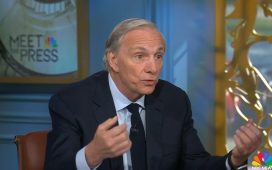Key events
The job market figures come after the government set out tax increases in the budget, including a rise in employer national insurance contributions (NICs) which business leaders say could hit hiring and pay increases.
Paul Daley at Capital Economics added:
Even though the rise in pay growth in September will probably be followed by a bigger gain in October, as the new public sector pay deals start, the easing in private sector regular pay suggests that the Bank of England will continue to cut interest rates gradually. We continue to think the Bank will skip the December meeting and cut rates at the following February meeting.
Public sector pay will probably jump again in October as the 5-6% pay deals agreed in recent months start to take effect… Most important for the Bank, was that private sector earnings excluding bonuses was stable at 4.8% in September. That left it exactly in line with the rate the Bank forecast last week.
Gora Suri, an economist at PwC UK, said:
The labour market continues to loosen, with vacancies dropping further, though still slightly above pre-pandemic levels. The unemployment rate also ticked up slightly to 4.3%.
But wage growth is proving to be a little more persistent. Annual growth in employee’s total earnings is up to 4.3%, reflecting the civil service one-off payments made in the summer. Despite a loosening labour market, nominal pay growth remains in excess of the circa 3% level that is considered to be consistent with the Bank’s 2% inflation target. Real pay continues to grow given that inflationary pressures have fallen back at a faster pace than wage growth.
Looking ahead, businesses are likely to face increasing cost pressures. Almost simultaneously, they have been hit with a trifecta of policy changes which raise their costs – an increase in employer NICs, a rise in the National Living Wage and the Employment Rights Bill. If businesses pass some of this onto workers, this could weigh on pay growth in the short to medium term.
Asda and Sainsbury’s said last week that the NIC rise would cost them £100m and £140m respectively as they warned they could pass these costs on in the form of higher prices, while Tesco faces a £1bn increase in its national insurance bill this parliament.
Introduction: UK unemployment rises while regular wage growth slows; bitcoin breaks $89,000
Good morning, and welcome to our rolling coverage of business, the financial markets and the world economy.
Unemployment in the UK has gone up, while regular wage growth slowed to the lowest rate in more than two years, according to official figures.
The unemployment rate rose to 4.3% between July and September, up from 4% in the June to August quarter, according to the Office for National Statistics, which warned that the job market figures should be treated with caution due to data collection issues.
Pay excluding bonuses climbed by 4.8% year-on-year, the lowest since June 2022. Including bonuses, wage growth picked up to 4.3% from 3.8%, although this was affected by one-off payments made to the civil service last summer.
Liz McKeown, the ONS’s director of economic statistics, said:
Growth in pay excluding bonuses eased again this month to its lowest rate in over two years. Pay growth including bonuses increased, but for recent periods these figures have been affected by last year’s one-off payments made to public sector workers.
Job vacancies have fallen again, as they have been doing for more than two years now. However, the total still remains a little above where it was before the pandemic.
The number of job vacancies fell to its lowest level since May 2021, down by by 35,000 on the quarter to 831,000 between August and October.
The pound fell by 0.5% to $1.2806, the lowest since mid-August, after the figures were released.
Paul Daley, chief UK economist at Capital Economics, said:
Overall, there is little here to suggest the Bank of England needs to worry that the loosening in the labour market and the easing in underlying wage growth are coming to an end.
Asian shares tumbled amid disappointment over Beijing’s latest economic stimulus package, and as investors worried about president-elect Donald Trump’s policies.
Meanwhile, bitcoin jumped to a new high of more than $89,000.
The Shanghai market lost 1.3% while Hong Kong’s Hang Seng slid by 3%.
The price of bitcoin, the world’s best-known cryptocurrency, has more than doubled from $37,000 a year ago, as markets are expecting lighter regulation of crypto currencies under a Trump administration. Bitcoin touched $89,982 and is now trading around $89,300.
The Agenda









